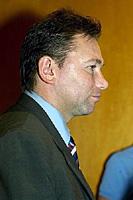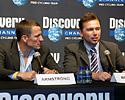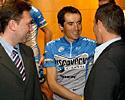
Recently on Cyclingnews.com |
An interview with Johan Bruyneel, January 29, 2006
The challenge is greater than ever

|
The man behind the wheel at Discovery Channel, Johan Bruyneel, will face the biggest test of his team directing career this season - without the confidence that having Lance Armstrong on your team can provide. Some say this will really show how much Bruyneel brings to what was arguably the best team in professional cycling in 2005. Cyclingnews' Mark Zalewski was able to chat one-on-one with Bruyneel at the team presentation in California, revealing his goals and predictions for the year, as well as his thoughts on the rift between the UCI and Grand Tour organisers regarding the ProTour.
Is the role of a coach contributing to the success of a team a quantifiable measure? Sure, Norman Dale in the epic sports film Hoosiers could be attributed with the majority of the responsibility for making his basketball team of raw and individual talent into champions - with only a little help from the superstar Jimmy pushing them over the top near the end. But what about a team with a athlete like Jimmy, or Michael Jordan, that is with them from the start? Is it the player, the coach, or both that make the team successful? Once Jordan retired from NBA basketball, Phil Jackson was faced with proving he could coach a team without the greatest basketball player in the world. Johan Bruyneel faces a similar situation as he enters the 2006 season, with Lance Armstrong retired and the cycling world watching and waiting to see if he is a great director, or if he was just riding on Lance's coattails.
The world got a miniscule glimpse up Bruyneel's sleeve this week at the Discovery Channel team presentation in Beverly Hills - and by miniscule I mean vague. "The goals remain unchanged," said Bruyneel of changes to his team strategy, sans Lance. "We have a lot of good riders. It's an ambitious group of guys. Myself, I am still ambitious and ready to go. Hopefully we can win a spring classic, finally."
Similar to his views on the team goals, Bruyneel is treating the team camp much the same as in previous years. "It has been very similar to last year - the amount of training, the intensity, the roads and hills we do - it's all the same." It seems that in terms of preparation and goal setting, not having Lance in the equation does not have much of an effect.
When asked to reflect on the previous seven years and how he hopes to be remembered, Johan replied, "It's been seven years of a lot of success. Actually, as long as you are doing this you don't really stop to think - you are just doing your thing, trying to win and win again. It's only now that myself and the rest of the team really start to realise what we have accomplished. We created history after the sixth victory, and then again after the seventh. How I want to be remembered is not up to me to decide. All I can say is that I am very proud with what we have done."
Place your bets

|
Many of the questions for Johan during the press conference, and in recent months, have been about who he thinks will win the Tour de France this year. Not wanting to replicate the same question, I asked who he thinks will finish second this year. "Ha! That is an even more difficult question! I don't know. I think right now after Lance - even though he says Ullrich is going to win it - [Jan winning] would be the most logical thing to happen. He has a record in the Tour that without Lance he would have won it... a few more times. Now that Lance is gone, and if he is motivated, and well prepared he should probably win it."
But Johan quickly pointed out that the most notable change is not that someone other than Lance will win, it is the fact that there is no clear favourite and that each is not infallible - a much different script than the past seven years in the eyes of Bruyneel. "I think the big difference is compared to the other years when Lance started as a favourite, and after 2000, if he was in good shape and no crashes, he was invincible. I think that is the big change, now there are other favourites which are likely to win the race, but I think they can all be beaten. That is the big change. There are a lot of other riders and teams out there that think they have a chance, which will make it interesting situation."
A grand ProTour?

|
The recent friction between the organisers of the Grand Tours and the UCI over the ProTour puts a director like Bruyneel, who wholeheartedly supports the ProTour idea, right in the middle. "I think it's time to solve the problem. I am a defender of the ProTour. I think it's a great idea and it's a new thing that cycling needs, in my opinion. Every new system has pros and cons, and when you put it in place, you have to be open for a trial period. I think we are still going through that trial period. What is a bit disappointing is that some parties have not been willing to go through that trial period, and I hope it can be solved. It has to be solved."
As a ProTour supporter and as a team director, Bruyneel sees much of the responsibility for making the partnership between the Grand Tours and UCI in the hands of the Grand Tour organisers - and that much of the problem is rooted in people losing sight over what is most important for cycling to succeed, teams and riders. "I think [the teams] have all fulfilled the conditions to be a part of it - all of the teams have been doing it. And I think the teams and riders are the main actors of cycling. We have made huge sacrifices to be part of the ProTour - invested more money, more staff, more riders, changes in the schedule, changed our goals - an nobody has complained. I think everybody is happy with the way it went. Unfortunately, the grand tours have not been doing the same thing, that is where the resistance comes from. I just think that cycling cannot be done without riders and teams and I hope that finally they will start to understand that."
Bruyneel also acknowledges that some aspects of the ProTour are not ideal, and that changes do need to be made in order to accommodate everyone's needs. "There are changes to be made - there are too many races on the calendar. There is not a lot of space for other races. But that is something that can easily be solved, you just have to go through the period of two or three years of just trying it out. Rome is not built in one day!
"I think every new system as to be open for modification. And it is open for modification. The only thing is that certain commitments have been made, and contracts are in place for multiple years, and we just have to get through that period."
Other than the Tour de France, which can easily stand on its own in the world of sport in general, Bruyneel says that all other races, from the other Grand Tours to the one day classics, are benefiting from the ProTour model by raising the level of competition. "The first year there are positive things about the ProTour. I think that the level of cycling went up a lot. A part of the Tour de France, which is the highest level in cycling... but I think the Giro benefited a lot from the ProTour. The Vuelta benefited a lot. A the races, Paris-Nice, Tour of the Basque country... the level was just so much higher thanks to the ProTour. So I really don't understand why those races, those organisers, cannot find themselves in the system. Because it brought their race to a higher level. It made their race more popular, and I think that is what it is all about."
Also see: Discovery Channel team presentation: Life after Lance
